Title search results
Showing 1 - 6 of 6 items

We don't know ourselves: A personal history of modern ireland
By Fintan O'Toole. 2022
In We Don't Know Ourselves, Fintan O'Toole weaves his own experiences into Irish social, cultural, and economic change, showing how…
Ireland, in just one lifetime, has gone from a reactionary "backwater" to an almost totally open society-perhaps the most astonishing national transformation in modern history. Born to a working-class family in the Dublin suburbs, O'Toole served as an altar boy and attended a Christian Brothers school. He was enthralled by American Westerns suddenly appearing on Irish television, which were not that far from his own experience, given that Ireland's main export was beef and it was still not unknown for herds of cattle to clatter down Dublin's streets. Yet the Westerns were a sign of what was to come. O'Toole narrates the once unthinkable collapse of the all-powerful Catholic Church, brought down by scandal and by the activism of ordinary Irish, women in particular. He relates the horrific violence of the Troubles in Northern Ireland, which led most Irish to reject violent nationalism. In O'Toole's telling, America became a lodestar, from John F. Kennedy's 1963 visit, when the American president was welcomed as a native son, to the emergence of the Irish technology sector in the late 1990s, driven by American corporations, which set Ireland on the path toward particular disaster during the 2008 financial crisis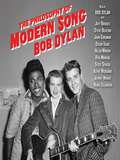
The philosophy of modern song
By Bob Dylan. 2022
The Philosophy of Modern Song is Bob Dylan's first book of new writing since 2004's Chronicles: Volume One —and since…
winning the Nobel Prize for Literature in 2016. The audio is narrated by an all-star lineup including Bob Dylan, Jeff Bridges, Steve Buscemi, John Goodman, Oscar Isaac, Helen Mirren, Rita Moreno, Sissy Spacek, Alfre Woodard, Jeffrey Wright, and Renée Zellweger! Dylan, who began working on the book in 2010, offers his extraordinary insight into the nature of popular music. He writes over sixty essays focusing on songs by other artists, spanning from Stephen Foster to Elvis Costello, and in between ranging from Hank Williams to Nina Simone. He analyzes what he calls the trap of easy rhymes, breaks down how the addition of a single syllable can diminish a song, and even explains how bluegrass relates to heavy metal. These essays are written in Dylan's unique prose. They are mysterious and mercurial, poignant and profound, and often laugh-out-loud funny. And while they are ostensibly about music, they are really meditations and reflections on the human condition. Running throughout the book are a series of dream-like riffs that, taken together, resemble an epic poem and add to the work's transcendence. In 2020, with the release of his outstanding album Rough and Rowdy Ways , Dylan became the first artist to have an album hit the Billboard Top 40 in each decade since the 1960s. The Philosophy of Modern Song contains much of what he has learned about his craft in all those years, and like everything that Dylan does, it is a momentous artistic achievement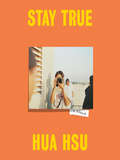
Stay true: A memoir
By Hua Hsu. 2022
A NEW YORK TIMES MOST ANTICIPATED BOOK • From the New Yorker staff writer Hua Hsu, a gripping memoir on…
friendship, grief, the search for self, and the solace that can be found through art. &“This book is exquisite and excruciating and I will be thinking about it for years and years to come.&” — Rachel Kushner, two-time National Book Award finalist and New York Times bestselling author of The Flamethrowers and The Mars Room In the eyes of eighteen-year-old Hua Hsu, the problem with Ken—with his passion for Dave Matthews, Abercrombie & Fitch, and his fraternity—is that he is exactly like everyone else. Ken, whose Japanese American family has been in the United States for generations, is mainstream; for Hua, the son of Taiwanese immigrants, who makes &’zines and haunts Bay Area record shops, Ken represents all that he defines himself in opposition to. The only thing Hua and Ken have in common is that, however they engage with it, American culture doesn&’t seem to have a place for either of them. But despite his first impressions, Hua and Ken become friends, a friendship built on late-night conversations over cigarettes, long drives along the California coast, and the successes and humiliations of everyday college life. And then violently, senselessly, Ken is gone, killed in a carjacking, not even three years after the day they first meet. Determined to hold on to all that was left of one of his closest friends—his memories—Hua turned to writing. Stay True is the book he&’s been working on ever since. A coming-of-age story that details both the ordinary and extraordinary, Stay True is a bracing memoir about growing up, and about moving through the world in search of meaning and belonging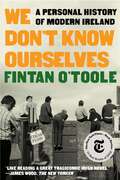
We Don't Know Ourselves: A Personal History of Modern Ireland
By Fintan O'Toole. 2021
NEW YORK TIMES BESTSELLER NEW YORK TIMES • 10 BEST BOOKS OF THE YEAR NATIONAL BESTSELLER The Atlantic: 10 Best…
Books of 2022 Best Books of the Year: Washington Post, New Yorker, Salon, Foreign Affairs, New Statesman, Chicago Public Library, Vroman's “[L]ike reading a great tragicomic Irish novel.” —James Wood, The New Yorker “Masterful . . . astonishing.” —Cullen Murphy, The Atlantic "A landmark history . . . Leavened by the brilliance of O'Toole's insights and wit.” —Claire Messud, Harper’s Winner • 2021 An Post Irish Book Award — Nonfiction Book of the Year • from the judges: “The most remarkable Irish nonfiction book I’ve read in the last 10 years”; “[A] book for the ages.” A celebrated Irish writer’s magisterial, brilliantly insightful chronicle of the wrenching transformations that dragged his homeland into the modern world. Fintan O’Toole was born in the year the revolution began. It was 1958, and the Irish government—in despair, because all the young people were leaving—opened the country to foreign investment and popular culture. So began a decades-long, ongoing experiment with Irish national identity. In We Don’t Know Ourselves, O’Toole, one of the Anglophone world’s most consummate stylists, weaves his own experiences into Irish social, cultural, and economic change, showing how Ireland, in just one lifetime, has gone from a reactionary “backwater” to an almost totally open society—perhaps the most astonishing national transformation in modern history. Born to a working-class family in the Dublin suburbs, O’Toole served as an altar boy and attended a Christian Brothers school, much as his forebears did. He was enthralled by American Westerns suddenly appearing on Irish television, which were not that far from his own experience, given that Ireland’s main export was beef and it was still not unknown for herds of cattle to clatter down Dublin’s streets. Yet the Westerns were a sign of what was to come. O’Toole narrates the once unthinkable collapse of the all-powerful Catholic Church, brought down by scandal and by the activism of ordinary Irish, women in particular. He relates the horrific violence of the Troubles in Northern Ireland, which led most Irish to reject violent nationalism. In O’Toole’s telling, America became a lodestar, from John F. Kennedy’s 1963 visit, when the soon-to-be martyred American president was welcomed as a native son, to the emergence of the Irish technology sector in the late 1990s, driven by American corporations, which set Ireland on the path toward particular disaster during the 2008 financial crisis. A remarkably compassionate yet exacting observer, O’Toole in coruscating prose captures the peculiar Irish habit of “deliberate unknowing,” which allowed myths of national greatness to persist even as the foundations were crumbling. Forty years in the making, We Don’t Know Ourselves is a landmark work, a memoir and a national history that ultimately reveals how the two modes are entwined for all of us.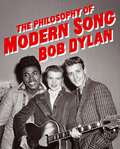
The Philosophy of Modern Song
By Bob Dylan. 2022
The Philosophy of Modern Song is Bob Dylan&’s first book of new writing since 2004&’s Chronicles: Volume One—and since winning…
the Nobel Prize for Literature in 2016. Dylan, who began working on the book in 2010, offers his extraordinary insight into the nature of popular music. He writes over sixty essays focusing on songs by other artists, spanning from Stephen Foster to Elvis Costello, and in between ranging from Hank Williams to Nina Simone. He analyzes what he calls the trap of easy rhymes, breaks down how the addition of a single syllable can diminish a song, and even explains how bluegrass relates to heavy metal. These essays are written in Dylan&’s unique prose. They are mysterious and mercurial, poignant and profound, and often laugh-out-loud funny. And while they are ostensibly about music, they are really meditations and reflections on the human condition. Running throughout the book are nearly 150 carefully curated photos as well as a series of dream-like riffs that, taken together, resemble an epic poem and add to the work&’s transcendence. In 2020, with the release of his outstanding album Rough and Rowdy Ways, Dylan became the first artist to have an album hit the Billboard Top 40 in each decade since the 1960s. The Philosophy of Modern Song contains much of what he has learned about his craft in all those years, and like everything that Dylan does, it is a momentous artistic achievement.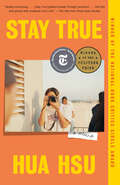
Stay True: A Memoir (Pulitzer Prize Winner)
By Hua Hsu. 2022
Winner of the Pulitzer PrizeWinner of the National Book Critics Circle AwardOne of the The New York Times&’s 100 Best…
Books of the 21st CenturyNew York Times Bestseller &“Quietly wrenching…To say that this book is about grief or coming-of-age doesn&’t quite do it justice…This is a memoir that gathers power through accretion—all those moments and gestures that constitute experience, the bits and pieces that coalesce into a life.&” — The New York Times&“[A] luminous and tender-hearted story. . . Stay True is a nuanced and beautiful evocation of young adulthood in all its sloppy, exuberant glory.&” — The Wall Street Journal &“An evolutionary step for Asian American literature.&” — New York MagazineIn the eyes of eighteen-year-old Hua Hsu, the problem with Ken—with his passion for Dave Matthews, Abercrombie & Fitch, and his fraternity—is that he is exactly like everyone else. Ken, whose Japanese American family has been in the United States for generations, is mainstream; for Hua, the son of Taiwanese immigrants, who makes &’zines and haunts Bay Area record shops, Ken represents all that he defines himself in opposition to. The only thing Hua and Ken have in common is that, however they engage with it, American culture doesn&’t seem to have a place for either of them.But despite his first impressions, Hua and Ken become friends, a friendship built on late-night conversations over cigarettes, long drives along the California coast, and the successes and humiliations of everyday college life. And then violently, senselessly, Ken is gone, killed in a carjacking, not even three years after the day they first meet.Determined to hold on to all that was left of one of his closest friends—his memories—Hua turned to writing. Stay True is the book he&’s been working on ever since. A coming-of-age story that details both the ordinary and extraordinary, Stay True is a bracing memoir about growing up, and about moving through the world in search of meaning and belonging.